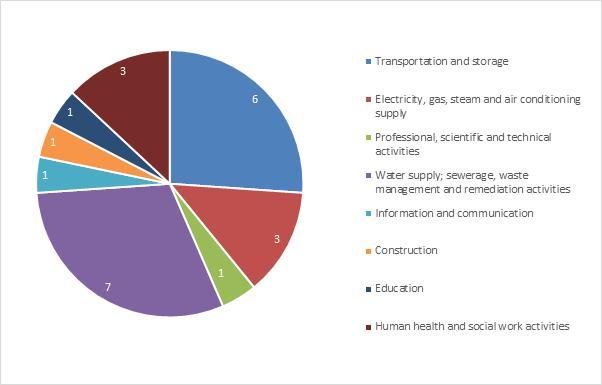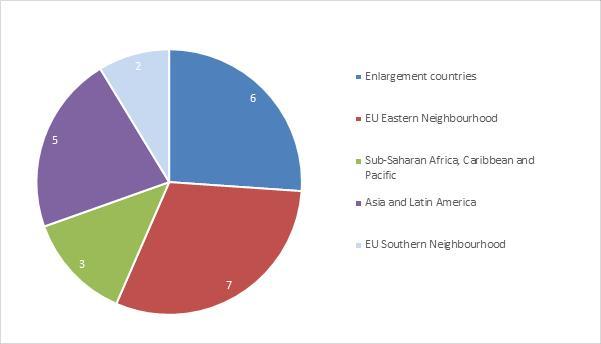1. Introduction
This report, prepared by the Secretariat of the Procurement Complaints Committee (PCC) of the European Investment Bank (EIB), provides an overview of the procurement complaints received and handled in the course of 2021, and of the work of the Committee and its Secretariat. It is the third annual report compiled and published on the Procurement Complaints Committee’s activities since its establishment in late 2018 [1].
In line with good practices of other international financial institutions, project-related procurement complaints submitted to the EIB are handled by the Procurement Complaints Committee, a dedicated, independent and impartial committee, mandated to handle procurement complaints that challenge the Bank’s decision on project procurement procedures under an EIB-financed project outside the EU. This system ensures that the Bank handles project procurement complaints regarding EIB-financed projects effectively and independently. If the complainant is not satisfied with the Bank’s outcome or response, it is entitled to escalate its complaint to the European Ombudsman for alleged maladministration by the Bank.
[1]The Procurement Complaints Committee Annual Report 2020 is available here
2. Brief overview of the EIB’s procurement complaints system
PCC’s remit, work and composition
The Procurement Complaints Committee is an independent Bank committee with four voting and two non-voting members consisting of senior representatives of different directorates of the Bank.
It is chaired by the EIB’s Inspector General and assisted by a Secretariat. The chairperson decides upon the admissibility of procurement complaints, is in charge of directing and facilitating the work of the Committee and oversees the Secretariat.
Promoters of projects financed by the EIB are required to follow the Bank’s Guide to Procurement (September 2018). This guide also describes the EIB’s procurement complaints processes. Promoters are fully responsible for implementing projects financed by the Bank, and in particular all aspects of the procurement process, from drafting tender documents and awarding contracts to implementing contracts. The involvement of the Bank is confined solely to verifying whether or not the conditions attached to its financing are met.
For projects financed by the Bank within the European Union, it is the relevant national remedy mechanisms which provide appropriate safeguards, through the transposition by EU Member States of EU procurement law, in particular the Remedies Directives, which set minimum national review standards.
For projects financed by the Bank in non-EU [2], the Bank uses a “non-objection” mechanism for approving procurement methods and outcomes. An important feature of the procurement complaints system is that the Bank requires its promoters that they observe a standstill period, which is the intervening period of time between the decision to issue a non-objection to the procurement award and the signature of the contract.
Complainants have the possibility of questioning a decision taken by the Bank (usually, but not limited to, a non-objection given by the Bank) for project procurement procedures financed under an EIB project. The Committee may decide to either confirm or withdraw the non-objection already issued by the Bank. If it decides to withdraw the non-objection, it may also recommend to exclude the project component from the Bank financing, and/or to undertake any other contractual remedies.
Complainants lodging procurement complaints may be “any party having or having had an interest in obtaining a particular contract and who has been or risks being harmed by an alleged infringement of the EIB’s Guide to Procurement.”
[2] In countries outside the European Union, the Bank requires that the main mechanisms of the EU directives on procurement be followed, with the necessary procedural adaptations (Section 1.1 of the Guide to Procurement for projects financed by the EIB, September 2018).
3. PCC complaints received during 2021
Taxonomy of admissible procurement complaints and corresponding processes
As described in the Guide to Procurement, procurement complaints that challenge the Bank’s decision on project procurement procedures under an EIB-financed project are classified and handled as follows:
Procurement complaints lodged prior to the Bank’s decision (objection or non-objection)
Complaints lodged prior to the Bank’s decision are redirected by the PCC’s Secretariat to the Bank’s services in charge of the respective projects for further follow-up. The substance of such complaints is considered when the Bank decides on the non-objection to the contract award.
Procurement complaints lodged after the Bank’s non-objection to contract award and prior to the signature of contracts
Complaints submitted after the Bank has provided its non-objection to the contract award and during the standstill period are reviewed by the Procurement Complaints Committee, which examines the case to enable the Bank to take a final position on whether to confirm or withdraw the non-objection issued by the Bank. The submission of this type of complaint triggers the suspension of the Bank’s non-objection until the Committee has completed its review. Considering that the Bank is not a party to the procurement contract, it can only take decisions concerning the financing it provides to a given project or project component.
Procurement complaints lodged following the Bank’s non-objection to contract award and after the signature of contracts
For complaints received after the standstill period has expired and the respective procurement contracts have been signed, the Committee can no longer redress the procurement procedure. However, it examines such admissible complaints to decide whether the Bank should confirm or withdraw its financing of the contract.
According to the Guide to Procurement, the Bank’s decision is taken in less than 30 calendar days from the submission of the complaint. In complex cases, this deadline may be extended to up to 60 calendar days.
In the course of 2021, the Procurement Complaints Committee received 23 procurement complaints, compared to 31 in 2020 and 12 in 2019. Of these, 18 were procurement complaints submitted prior to the Bank’s decision/non-objection (compared to 20 such complaints in 2020)[3]. Accordingly, these complaints were redirected by the PCC’s Secretariat to the Bank’s services in charge of the respective projects for further follow-up as per the Guide to Procurement.
The remaining five procurement complaints were submitted to the Committee following the Bank’s non-objection to contract award.[4] One of these was withdrawn by the complainant prior to its scheduled review. The Procurement Complaints Committee therefore reviewed and decided upon four procurement complaints. It voted to uphold the Bank’s non-objection for three out of these four complaints and voted to withdraw the Bank’s non-objection in one case.
More details on all 23 procurement complaints are provided in the table below, and in the following section.
[3] Eight procurement complaints submitted prior to the Bank’s decision/non-objection in 2019.
[4] Compared to ten procurement complaints submitted following the Bank’s non-objection to contract award in 2020 and four in 2019.
i. PCC complaints by concerns raised by the complainants
Table 1
|
Procurement complaints lodged prior to the Bank’s decision |
||
|
Complaint reference |
Country of project concerned |
Nature of allegation |
|
PCC/2021/02 |
Bosnia and Herzegovina |
Restrictive technical specifications |
|
PCC/2021/03 |
Ukraine |
Public opening of tenders |
|
PCC/2021/04 |
Ukraine |
Public opening of tenders |
|
PCC/2021/05 |
Ukraine |
Restrictive technical specifications |
|
PCC/2021/07 |
Ecuador |
Improper evaluation of tenders |
|
PCC/2021/08 |
Ukraine |
Non-responsive promoter |
|
PCC/2021/09 |
Senegal |
Non-responsive promoter |
|
PCC/2021/10 |
Tunisia |
Refusal of tenderer's price updates; clarification requests |
|
PCC/2021/12 |
Georgia |
Allegations related to the information included in the winning tender |
|
PCC/2021/13 |
Ecuador |
Unjustified exclusion; |
|
PCC/2021/14 |
Bosnia and Herzegovina |
Rejection of request for access to documents; breach of the principle of equal treatment |
|
PCC/2021/15 |
Serbia |
Restrictive technical specifications |
|
PCC/2021/16 |
Ecuador |
Unjustified disqualification |
|
PCC/2021/18 |
Bosnia and Herzegovina |
Allegations with respect to irregularities over the tender evaluation; origin of goods |
|
PCC/2021/19 |
Tunisia |
Unjustified postponement of the procurement procedure |
|
PCC/2021/20 |
Sri Lanka |
No clarifications provided by the promoter on ambiguous procurement documents following submission |
|
PCC/2021/21 |
Sri Lanka |
Ambiguous procurement documents |
|
PCC/2021/23 |
Niger |
Conflict of interest; erroneous evaluation |
...
|
Procurement complaints lodged after the Bank’s non-objection to contract award |
||||
|
Complaint reference |
Country of project concerned |
Nature of allegation |
||
|
PCC/2021/01 |
Serbia |
Arithmetic error in the evaluation; conflict of interest |
||
|
PCC/2021/06 |
Mauritania |
Evaluation of technical experience/references to projects and conduct of clarifications |
||
|
PCC/2021/11 |
Ukraine |
Non-compliance of winning tender with technical requirements; undeclared antitrust violations of the winning tenderer; Covenant of Integrity |
||
|
PCC/2021/17 |
Bosnia and Herzegovina |
Extension of the deadline for the submission of tenders; promoter wrongfully dismissed the complainant’s tender |
||
|
PCC/2021/22 |
Ukraine |
Rejection based on failure to show completion of similar projects |
||
ii. PCC complaints by sector
The following table shows a breakdown of the projects subject to the 23 procurement complaints by sector.

iii. PCC complaints by region of operation
The following table shows a breakdown of the projects subject to the 23 procurement complaints by region of operation.

4. Observations
Nearly four in five procurement complaints (that is 18 out of 23 or 78.3%) were submitted prior to the Bank’s decision (non-objection) as per Table 1. While this number in absolute terms is consistent with 2020 data (20 such procurement complaints out of 31 in 2020), the proportion of procurement complaints submitted prior to the Bank’s decision is higher compared to 2020 (64.6% in 2020 versus 78.3% in 2021). This is due to the lower number of complaints that were received after the Bank’s decision (five in 2021 as opposed to 11 in 2020), resulting in a lower total number of complaints (23 in 2021 compared to 31 in 2020).
In terms of sectors, most complaints concern procurement under projects related to transport and storage, which account for 26% of the complaints (38.7% in 2020), and water supply; sewerage, waste management and remediation activities, which account for 31% of the complaints (35.5% in 2020). Procurement complaints related to electricity, gas, steam and air conditioning supply represent 13% (16.1% in 2020). The breakdown of procurement complaints by sector does not raise particular concerns for any given sector, especially given that the proportions are quite similar to those of 2020.
In terms of regions of operation, most procurement complaints regarded projects in the EU Eastern Neighbourhood (30%) and the enlargement countries (26%), followed by Asia and Latin America (22%). This is consistent with 2020 data where the share of complaints on projects in the enlargement countries and the EU Eastern Neighbourhood was 35.5% each. Complaints on projects in sub-Saharan Africa represented 13% (same as in 2020), while the proportion of complaints for projects in Asia and Latin America increased from 10% in 2020 to 22% in 2021.
The most common allegations were unequal treatment, restrictive/discriminatory requirements, flawed technical evaluation or selection in relation to technical requirements and professional/technical capacity levels, conflicts of interest and allegations in relation to the extension of submission deadlines. In one case, the complainant made allegations related to the Bank’s Covenant of Integrity.
Of the five complaints reviewed by the Procurement Complaints Committee, three complainants were based in the countries where the projects were located. The winning bidders of these five procurement procedures were all based in the countries of the projects concerned.
The response time for procurement complaints lodged after the Bank’s non-objection to contract award and prior to the signature of contracts was in general in line with the Bank’s policy (Annex 8 to the Guide to Procurement for projects financed by the EIB). Complainants received the Committee’s reply and decision within less than the 60 days period envisaged by the Guide to Procurement, except in one case where the reply was submitted after 79 days due to the complexity of the case.
The PCC’s Secretariat always informs complainants that if they are not satisfied with the Bank’s response, they are entitled to escalate their complaint to the European Ombudsman for alleged maladministration by the Bank. One 2020 complaint was escalated to the Ombudsman during the first half of 2021. The Ombudsman held that there were not sufficient grounds to open a full inquiry and found that the EIB had provided the complainant with a reasoned and appropriate reply.
Procurement complaints were submitted mainly through the dedicated mailbox (procurementcomplaints@eib.org), with fewer complaints received through different channels when compared to previous years. This could indicate that the Procurement Complaints Committee has become more widely known as the main entry point for prospective procurement complainants and that the website has helped increase the visibility of the PCC.
The new website also includes the Committee’s privacy statement, which provides information on the handling of personal data in the context of the activity of the Committee since 2020. This statement was developed in close cooperation with the Bank’s Data Protection Officer.
As in previous years, the PCC’s Secretariat has received a number of emails that are not necessarily related to project procurement at the EIB but might present issues falling within the mandates of the Inspectorate General Investigations Division (IG/IN) or the Complaints Mechanism (IG/CM). The Secretariat’s position within the Inspectorate General facilitates communication and cooperation as well as the transfer of complaints to IG/IN concerning allegations of prohibited conduct and to IG/CM for non-procurement related complaints.
The Secretariat also monitors whether the EIB services concerned take the necessary follow-up action in the case of procurement complaints lodged prior to the Bank’s decision.
5. Outlook for 2022
For 2022, the PCC’s Secretariat has planned to revisit specific aspects of its procedures and certain standard internal process documents with a view to improving the Procurement Complaints Committee’s way of working. While almost all complainants have received timely replies from the Committee (one delayed response only per year since 2019), lessons learned during its three years of operation could help enhance the overall process in terms of time management, while maintaining a high review standard.
The Secretariat will continue working with the Bank’s Data Protection Officer to ensure that the Committee’s and the Secretariat’s work remain compliant with the applicable data protection rules, taking into account any developments in the legal framework.
March 2022
